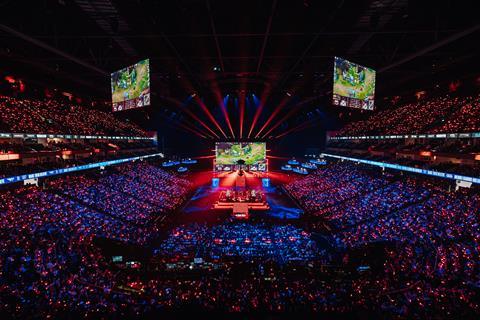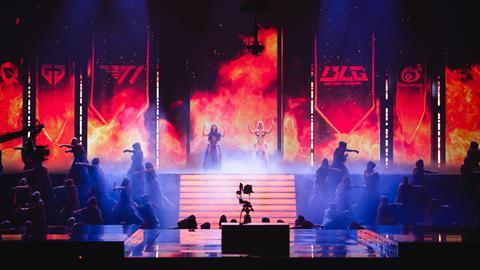Gael Caselli at AEG Europe discusses the development of arena-based esports spectacles

In 2025, esports continues its global expansion, with predictions projecting a market revenue of $4.8 billion and a growing global audience of over 640 million.
Thanks to the huge growth of social media and streaming, esports fans are more connected than ever and are one of the most enthusiastic and tightknit communities on the planet.
Deeper connections are formed through platforms that allow fans to play, discuss, and celebrate their favourite games online. But how have live events come to fit into this electronic world?
Unlike traditional sports, esports exists in two dynamic spaces: the digital realms of Twitch, YouTube, and other streaming platforms, and increasingly, in packed arenas hosting high-energy live events.
As the industry’s popularity surges, so does the appetite for in-person experiences – fuelling the rise of next-generation, immersive entertainment and redefining how fans engage with the action.
What was once a niche, and somewhat isolated, audience has become a thriving global community. While online platforms laid the foundation, it’s the live experience that’s seemingly the next development of amplifying that connection.
Today’s tournaments go beyond gameplay, delivering festival-like atmospheres with live music, interactive watch parties, and exclusive merchandise drops – all designed to deepen engagement and bring fans even closer to their favourite teams and players.
With such rapid growth and widespread popularity, sights are firmly set on the further development of more arena-based esports spectacles, with global venues diversify offerings and innovations to meet the needs of this vast industry expansion. In recent years, live arena esports events have seen huge demand, with tickets selling out in minutes, and generating millions of views worldwide.

We have seen firsthand how hosting live esports events across Europe has been pivotal to providing new and exciting opportunities to both fans and franchises alike. Having brought some of the absolute best esports championships to life, it is a full circle moment when we look at how live entertainment is shaping the current esports ecosystem and vice versa, continuing to transform competitive gaming into the global phenomenon it is today.
Last year, we brought the largest esports event in history to life at The O2 in London – The 2024 League of Legends World Championship Finals. After already selling out AEG Europe’s adidas Arena in Paris in October for the quarter and semi-finals, the 14,500 tickets for the grand finale at The O2 sold out within in minutes.
Alongside the adrenaline-pumping gaming activities and cosplay competitions that saw fans embody their favourite characters, live music also featured heavily, as audiences were treated to one of the very first performances of reformed rock legends, Linkin’ Park.
Peak viewership reached an incredible 6.7 million virtually, and it was calculated by investment firm, London & Partners, that the finals drew in a £12m boost to the London economy, cementing the city’s position as a leading destination for sports and esports.
Germany has also been heralded as one of Europe’s major esports hubs, and our venues across the region have hosted a range of hugely popular esports events, including EA Sports FC Pro World Championship 2024 at the Uber Eats Music Hall in Berlin, which drew tens of thousands of fans both in person and online.
This year, we are proud to be hosting The International 2025, Dota 2’s biggest tournament of the year, at the Barclays Arena in Hamburg. It will be the first time the championship has taken place in Germany since its inaugural tournament back in 2011, which demonstrates Germany’s pull when it comes to hosting large-scale esports championship finals.
As esports continues to evolve, high-quality live streams and broadcasts remain a crucial element of these multi-faceted events – giving millions of fans the chance to feel part of the action, wherever they are.
Behind the scenes, collaboration between venue teams, esports franchises and promoters plays a vital role in creating these immersive experiences. From interactive elements to seamless streaming, it’s all about enhancing access and deepening fan connection – on site, online, and across the global esports community.
According to a recent report by Research & Markets, the global esports market is estimated to reach $18.85 billion by 2035. This places the industry at a real turning point, with developing technologies continuing to revolutionise gameplay and elevate fan engagement and experience.
Inevitably, community remains the lifeblood of the esports industry, with advancements being driven by the millions of devoted fans across the world. As we strive to deliver even more thrilling live viewing experiences across our venues in Europe, we are excited to continue to be part of the fabric of the fast-growing, global esports ecosystem, and look forward to the exciting future ahead.

Gael Caselli is VP Sport at AEG Europe





No comments yet